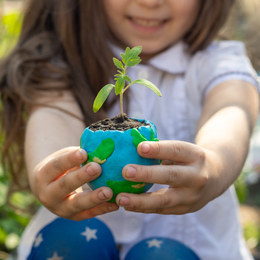
Beyond Academics
School curricula that cultivate empathy and other “soft skills” may help students deepen their connection to the world around them.
In order to succeed in the real world, today’s students need to know much more than proficiency in the standard-bearers of reading, writing, and arithmetic. Other essential skills such as empathy and compassion, often referred to as “soft skills,” play an increasingly important role in teaching students to become productive young adults who feel connected to others and the world around them.
Interpersonal skills such as empathy, relationship building, teamwork, problem solving, critical thinking, and effective communication go a long way in shaping students’ success once they leave the school environment. Such skills can be “integrated into the experience in the classroom,” says Alexa Quinn, associate head of school at Friends’ Central School in Wynnewood.
“As a school, we work hard to foster empathy in our students,” Quinn adds. “Part of our mission and vision as a school is for our students to peacefully transform the world. In order to do that they need to have superb academic skills, a strong sense of their voice and themselves, and the ability to connect and collaborate with other people—particularly people who are different from them.”
At Friends’ Central, empathy enters the curriculum via classwork in the humanities, through visits from outside speakers, and through affinity groups and service projects. Considering Friends’ Central’s Quaker roots, one might even say empathy is built into the school’s DNA.
“The humanities are an essential avenue for teaching empathy in schools,” says Quinn, a former English teacher. “Literature and history enable us to see the world through others’ eyes and learn about the human condition and experiences that are different from our own. Perhaps one of the most important lessons we learn in the humanities is that even with a person or situation in history that is totally different from you, there are points of connection and you discover there are small components that you might have in common.”
As part of its programming, Friends’ Central often brings in outside speakers to bridge the gap between lessons learned in the classroom and fostering understanding of experiences others in the communities around us have had. Quinn believes these visits can be “very powerful” in helping students understand and empathize with others at deeper levels.
“For example,” she says, “we often bring in a Holocaust survivor to speak to our students after they have studied the Holocaust in history class or read literature or memoirs focusing on the subject. Having people who have experienced something in the same room, sharing their memories, and answering students’ questions is another level of education, which goes beyond schooling, and cultivates empathy.”
At The Crefeld School in Chestnut Hill, coming together to support each other and others in the community is a key part of the school’s mission. The school strives to educate empathetic, self-aware, lifelong learners who have an appreciation for diverse perspectives and their role in society, and “want to make an impact on the world around them,” says Assistant Head of School Ryan Coffey Keaton. Keaton cites a daily Morning Meeting, which emphasizes the value of speaking, listening, and reflection; a weekly Community Service Learning program; and weekly Community Meeting programming, where students learn to work together, engage with their teachers, and transform their local communities.
Community Service Learning is an integral part of each student’s learning experience at Crefeld. Every Wednesday afternoon the entire school community, including faculty and staff, participates in service projects focusing on helping others. Examples include Bethesda Project, a nonprofit organization that provides shelter, housing, and supportive services to adults who are experiencing homelessness in Philadelphia; the Schuylkill Center for Environmental Education; working in senior care communities; and tutoring at local elementary schools.
“We try to get the students engaged in something they’re drawn to or encourage them to take a chance on something they might enjoy,” adds Gena Lopata, Crefeld’s dean of faculty and curriculum coordinator. “By sending the students out into the community, we’re fostering independence, as well as giving them a deeper sense of belonging and opening their eyes to the differences around them.”
Service learning is a part of every student’s experience at The Shipley School in Bryn Mawr. Head of School Michael G. Turner cites the school’s mission of “developing within each student a love of learning and a desire for compassionate participation in the world.”
“Our primary focus is on the learning part of the service,” he adds. “For example, if we’re working in a local shelter, soup kitchen, or food pantry, while we are assisting those struggling with homelessness or food insecurity, our goal is for the students to develop an understanding of what it means to be compassionate participants, doing their part to help others while gaining an understanding of what they may need. Our job is to prepare them to go out into the world and continue to have that kind of an impact on their local communities.”
Shipley’s curriculum is devoted to students’ social, emotional, and ethical development, or SEED. The school’s SEED curriculum aims to connect traditional classroom disciplines with social issues and support for the community, both inside and outside of the school environment.
“We focus on everything from identity formation, who you are as an individual, to what your role is within the various communities you’re a part of and how that connects to the broader world,” says Turner. “We’re teaching students that we’re all in this together, that their well-being affects the well-being of the people around them. These are the critical skills that will contribute to their long-term success.”
Published (and copyrighted) in Suburban Life, November 2022.
Published (and copyrighted) in Suburban Life, November 2022.


